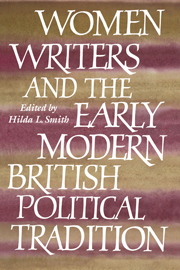Book contents
- Frontmatter
- Contents
- List of contributors
- Preface
- Introduction: Women, intellect, and politics: their intersection in seventeenth-century England
- Part I Women's political writings, 1400–1690
- Part II Women's political and philosophical writings, 1690–1800
- Part III The intellectual context and economic setting for early modern women
- Introduction to Part III
- 9 Contract and coercion: power and gender in Leviathan
- 10 The significant sounds of silence: the absence of women from the political thought of Sir Robert Filmer and John Locke (or, “Why can't a woman be more like a man?”)
- 11 Catharine Macaulay: patriot historian
- 12 Investments, votes, and “bribes”: women as shareholders in the chartered national companies
- Part IV Early modern legal and political prescriptions for women
- Conclusion: women's writing, women's standing: theory and politics in the early modern period
- Index
12 - Investments, votes, and “bribes”: women as shareholders in the chartered national companies
from Part III - The intellectual context and economic setting for early modern women
Published online by Cambridge University Press: 04 August 2010
- Frontmatter
- Contents
- List of contributors
- Preface
- Introduction: Women, intellect, and politics: their intersection in seventeenth-century England
- Part I Women's political writings, 1400–1690
- Part II Women's political and philosophical writings, 1690–1800
- Part III The intellectual context and economic setting for early modern women
- Introduction to Part III
- 9 Contract and coercion: power and gender in Leviathan
- 10 The significant sounds of silence: the absence of women from the political thought of Sir Robert Filmer and John Locke (or, “Why can't a woman be more like a man?”)
- 11 Catharine Macaulay: patriot historian
- 12 Investments, votes, and “bribes”: women as shareholders in the chartered national companies
- Part IV Early modern legal and political prescriptions for women
- Conclusion: women's writing, women's standing: theory and politics in the early modern period
- Index
Summary
To understand the extent of women's political participation in the early modern period we need to exercise historical imagination to see beyond courts and legislatures to the myriad other institutions in which significant sorts of political power have been exercised. Although the histories of companies are usually thought of as proper subjects for business or economic history, I want to consider here two companies that ought also to be considered subjects of political history: the South Sea Company and the East India Company. Both companies were joint state/private ventures, chartered by the state and given monopoly trading privileges in their respective areas of the world. Both were involved in underwriting the national debt, a fact which produced company leverage on government officials. Government officials were also significantly involved in the affairs of each company. Parliament passed, in addition to the statutes granting and renewing the charters, a series of regulatory statutes concerning each company.
A corollary of the fact that these companies were chartered by statute in return for payments to the state was that the companies were dependent upon politicians to introduce bills they wanted, to muster parliamentary support for their passage, to organize the defeat of unwanted bills, and, in general, to see to it that negotiations between the state and company produced results advantageous to the company.
- Type
- Chapter
- Information
- Women Writers and the Early Modern British Political Tradition , pp. 259 - 278Publisher: Cambridge University PressPrint publication year: 1998
- 7
- Cited by

